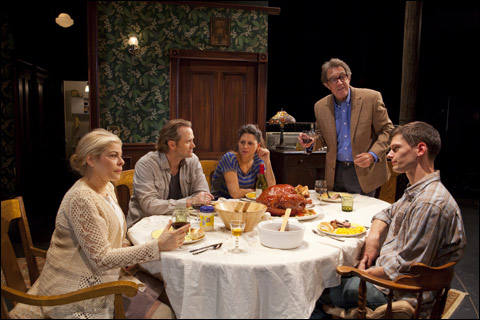
GRUNT! Does anyone smell a metaphor for a corrupt yet sanctimonious America here? |
The ghosts of Arthur Miller and Sam Shepard hover over Vengeance Is the Lord's in its world premiere by the Huntington Theatre Company (at the BU Theatre through December 12). But the authors of All My Sons and Buried Child take an ectoplasmic back seat to the play's acknowledged specter, that of murdered daughter Cheryl. She's the Horvath family's "darling angel in heaven," enshrined in both a carefully preserved downstairs bedroom and the otherwise tainted hearts of her devoted kin, bastions of family values whose small-time criminal enterprises fund the holiday feasts that form the trimmings of Bob Glaudini's new play. More salty than schmaltzy, yet unabashedly evocative of Norman Rockwell, the Horvaths' holiday celebrations cycle from Thanksgiving turkey to Easter ham as the clan contemplates the parole of their loved one's killer, the cheek-turning counsel of Jesus vying with patriarch Matthew's preference for the Old Testament, with its "tough-minded sons of bitches who slaughter their enemies."
Devoid of the ethical bombast of Miller and the mystical symbolism of Shepard, Vengeance is nonetheless more morality than revenge play, its particular trick the scathing juxtaposition of pragmatic amorality and moral self-justification around the Horvath groaning board (or outside on the porch, to which smoking and criminal conversation are banished). Does anyone smell a metaphor for a corrupt yet sanctimonious America here?
Suspended between Miller's guilt-denying Kellers and the mob royalty of The Sopranos, the Horvaths are working-class antiheroes who have taken some very wrong turns on their way toward the American dream; they have also sidestepped, for the most part, whatever culpability they might be expected to feel for having built their small-time empire of barrooms and auto-body shops on a foundation of thievery, thuggery, and worse, with some of the clan doing the dirty work while the others try to ignore the clods clinging to their relatives' hands. The crisis of the play does not spring just from the imminent release of Cheryl's killer, whom ailing matriarch Margaret wants to greet with an olive branch whereas Matthew and oldest son Woodrow lean toward a bullet. There's also some nasty business that is proving difficult to sweep under the rug, especially with younger son Donald doggedly turning back the carpet corners and bleating about justice while wrestling with his own complicity.
Glaudini is an intricate writer whose plot points can be as blurry as the Horvaths' ethics, but whose characters are as toughly, believably human as they are fallible. Best known for his 2007 play Jack Goes Boating, which was recently released as a film directed by and featuring its original star, Philip Seymour Hoffman, Glaudini has a diverse résumé that runs from helming the 1971 premiere of Shepard's and Patti Smith's Cowboy Mouth to appearing in Grunt! The Wrestling Movie. This is the third of his plays to be directed by Huntington honcho Peter DuBois, who gets their odd mix of dreamy metaphor and gritty realism. Here the combination is reinforced by Tony winner Eugene Lee's set, an architecturally accurate maze of well-worn, knickknack-laden downstairs spaces squeezed between bits of chain-link fence on a turntable that glides as magisterially as a barge.
The actors, too, expertly personify the hardscrabble Horvaths, bolting their ritual repasts on the way toward shady doings and postprandial drinks. Larry Pine is all charm and thunder as Matthew, and Karl Baker Olson, as Donald, fights a noble if rhetorically confused and spineless battle to roll off the bosom of the family onto solid moral ground. Most impressive is Roberta Wallach's blunt matriarchal spitfire, who weathers a knee replacement and a hip replacement but who cannot in the end, albeit medicated by pain pills and Catholicism, endure a hate replacement.